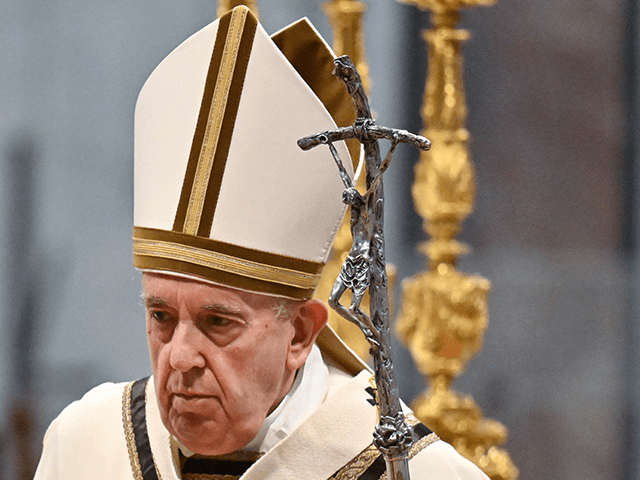ROME, Italy — Pope Francis said Thursday that Christians must be on special guard against idolatry, which takes worship away from the true God and gives it to the devil.
All of us have “hidden idols,” the pontiff said during the Chrism Mass in Saint Peter’s Basilica on Holy Thursday, and “there, in those spaces we mark out as exclusively ours, the devil insinuates himself with his poison.”
Satan “not only makes us self-complacent, giving free rein to one passion or nurturing another, but he also leads us to replace with those idols the presence of the divine Persons, the Father, the Son and the Spirit who dwell within us,” he warned.
We may tell ourselves that we know perfectly well the difference between God and an idol, Francis stated, but in practice “we take space away from the Trinity in order to give it to the devil, in a kind of oblique worship.”
There is “something about idols that is personal,” he said. “When we fail to unmask them, when we do not let Jesus show us that in them we are wrongly and unnecessarily seeking ourselves, we make room for the Evil One.”
Satan “works quietly and slowly,” he declared, and little by little he takes over.
“We need to remember that the devil demands that we do his will and that we serve him, but he does not always ask us to serve him and worship him constantly; but beware, he is a great diplomat,” the pope warned.
“Receiving our worship from time to time is enough for him to prove that he is our real master and that he can feel like a god in our life and in our heart,” he said.
In his homily, the pope went on to reference three specific instances of “hidden idolatry,” namely that of “spiritual worldliness,” of a “pragmatism” of numeric results, and of “functionalism.”
Spiritual worldliness is triumphalistic, Francis said, and seeks “glory without the cross,” a temptation that “runs contrary to the very person of the Lord.”
Numerical pragmatism, on the other hand, is manifested in a “love for statistics, numbers that can depersonalize every discussion and appeal to the majority as the definitive criterion for discernment.”
“In this fascination with and love of numbers, we are really seeking ourselves, pleased with the control offered us by this way of thinking, unconcerned with individual faces and far from love,” he asserted.
Functionalism, finally, rejects mystery in a search of efficiency, he proposed.
“‘Functionaries’ take no delight in the graces that the Spirit pours out on his people, from which they too can ‘be nourished’ like the worker who earns his wage,” he stated.
In functionalism, “we set aside the worship of the Father in the small and great matters of our life and take pleasure in the efficiency of our own programs.”
Jesus Christ, Francis concluded, “forces these idols to show themselves, so that we can see their presence, their roots and the ways they operate, and allow the Lord to destroy them.”
“This is the proposal: allow the Lord to destroy those hidden idols,” he said. “We should keep these things in mind and be attentive, lest the weeds of these idols that we were able to hide in the folds of our hearts may spring up anew.”

COMMENTS
Please let us know if you're having issues with commenting.